This inventarisation is limited to the practical game; no longest
winning streaks; youngest grandmasters; selfmates in 418. "This is the record"
means: "this is the record as known & recognized by me."
Some of these records, like Longest Game
and Most Queens, have been the subject of publications for a
century; others are meant as an opening bid. I'm open to new records
and suggestions for new categories, but only "serious and verifiable tournament games",
although that is an elastic concept, will be considered. Records from
correspondents will be examined with suspicion. Computer games are out.
For this update,
Chess Query Language (see my
Diary about it, too), was a major help. It facilitated old and enabled
new searches, prompting a few new categories.
To make this page lighter, I removed
the moves of the longer games. They are in the gamefile
recgames.pgn which can be downloaded. All the games
can be played
over online with Palview.
Longest Game:
269
In the top ten, the moves of games marked * are not (all) known.
| 269 | 20.15 h. | Nikolic (I.) - Arsovic | ½-½ | Belgrade 1989 |
| 209 | 16.40 h. | Chekhlov - Stavrinov * | ½-½ | Riga, City Ch. 1988 |
| 200 | 16.20 h. | Wegner - Johnsen | ½-½ | Gausdal 1991 |
| 200 | ?? | Meiers - Rausis * | ½-½ | Riga, Ch. Latvia 1989 |
| 196 | ?? | Murey - Rausis | ½-½ | Paris 1995 |
| 194 | 19.30 h. | Martinovsky - Jansa | ½-½ | Gausdal 1987 |
| 193 | 24.30 h. | Stepak - Mashian | 1-0 | Israel Ch. semifinals 1980 |
| 192 | 19.30 h. | Asfora - Calçado | 1-0 | Bebedouro 1991 |
| 191 | 23 h. | Pilnik - Czerniak | ½-½ | Mar del Plata 1951 |
| 191 | ?? | Seirawan - Xu | ½-½ | Thessaloniki ol. 1988 |
Pilnik - Czerniak was in the Guinness Book of Records for ages. Now, it is about to drop out of the top-10, mainly because the 50-move rule was for some time (until 1992) a 100-move rule, permitting determined players to go on twice as long as before in endings like the dreaded R+B vs. R. Six of the top ten, including the champion, had this endgame.
As long as it's a 50-move rule again, and "thinking chess"
has been all but abolished by FIDE, Nikolic
- Arsovic, with its 269 moves, is unbeatable.
It's a Beamon jump ahead of the others (it even beats most fake and joke
games of before), but Stepak - Mashian still holds two other records:
that of the longest decided game and of the longest game in time.
A special record was set by GM Cheparinov who played games of 155 and 150 moves vs. Stefanova and Onischuk in consecutive rounds in the Corus (B) Tournament of 2005.
Back to the list
There are draws in 2, 1 or even 0 moves, forfeited games of 1 move, joke games of 3 moves, and what not, but the shortest decided game ever played in a serious tournament is:
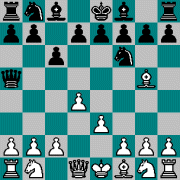 1.d4 Nf6 2.Bg5 c6 3.e3 Qa5+ and White resigned.
1.d4 Nf6 2.Bg5 c6 3.e3 Qa5+ and White resigned.
This happened in Djordjevic - Kovacevic, Bela Crkva 1984
and
Vassallo - Gamundi, tt Spain, Salamanca 1998.
But this will not prevent "Gibaud
- Lazard, Paris 1924, 4 moves" being published
as the shortest ever loss in a "master game": 1.d4 Nf6 2.Nd2 e5 3.dxe5 Ng4 4.h3
Ne3 and White resigned. Almost everything is incorrect about that statement:
it was not a master game, White was perhaps not poor Gibaud, it was not
played in 1924, it was 5 instead of 4 moves, and even at 4 moves, it would
have had to share honours with other games.
What is true is that in his autobiography, Lazard
gave a friendly game "Amateur" - Lazard, played in Paris,
"around 1922", which went
1.d4 d5 2.b3 Nf6 3.Nd2 e5 4.dxe5 Ng4 5.h3 Ne3 and White resigned.
Here, 5.h3 is not as stupid a blunder as in the shorter version, because
White could at least have hoped to win a tempo after 5...Nxe5 6.Bb2. "Amateur"
becoming Gibaud, and Gibaud the proverbial patzer,
is not Lazard's fault; he mentioned "a very strong player whose talent
is done no justice by this game."
In fact, Gibaud was champion of France
no less than four times. He didn't like this 4-move game going around
with his name attached. When in 1937 the British magazine Chess
published it as "the shortest tournament game ever played,
from a Paris Championship", he wrote a letter.
Chess answered in its pages: "He never lost any
tournament game in four moves. Searching his memory he recalls a skittles
he once played against Lazard, a game of the most light-hearted variety,
in which, his attention momentarily distracted by the arrival of his friend
Muffang, he played a move which allowed a combination of this genre - but
certainly not four moves after the commencement of the game. Rumour, he
said, must have woven strange tales about this game."
Lazard was of master strength too, but he is better
known as a composer of endgame studies and problems.
An even more understandable variation of this game
has occurred several times: 1.d4 Nf6 2.Nd2 e5 3.dxe5 Ng4 4.Ngf3 Be7 5.h3
Ne3.
For more on very short games, see this
Dutch column
and item 149 in my
Open Chess Diary.
Back to the list
In both games in this section, the games ended before there was any capture.
 In Meijfroidt - Lenoir, Veurne 2000, White overstepped
the time limit in this position on move 72.
In Meijfroidt - Lenoir, Veurne 2000, White overstepped
the time limit in this position on move 72.
 In this position after Black's 70th move, Filipowicz - Smederevac,
Polanica Zdroj 1966 was declared a draw. According to Filipowicz,
he offered a draw twice, and when that was refused, he baffled
his opponent by claiming a draw on the ground of the 50-move rule -
probably the most crowded position in which that rule was ever invoked.
In this position after Black's 70th move, Filipowicz - Smederevac,
Polanica Zdroj 1966 was declared a draw. According to Filipowicz,
he offered a draw twice, and when that was refused, he baffled
his opponent by claiming a draw on the ground of the 50-move rule -
probably the most crowded position in which that rule was ever invoked.
Back to the list
Longest decided game without a capture: 31 moves
 Nuber - Keckeisen, Mengen 1994
Nuber - Keckeisen, Mengen 1994
1.e4 b6 2.d4 e6 3.Bd3 Bb7 4.Nf3 g6 5.O-O Bg7 6.Nbd2 Ne7 7.Re1 O-O
8.Nf1 d6 9.Qe2 Nd7 10.Bg5 Qe8 11.Rad1 a5 12.c3 Rc8 13.Ng3 Kh8 14.Qd2 Ng8
15.h3 e5 16.Bc2 h6 17.Be3 Rd8 18.Nh2 Kh7 19.f4 f6 20.Qf2 Ne7 21.Rd2 Rh8
22.f5 g5 23.Bd1 Rb8 24.Bh5 Qf8 25.Ng4 Ba6 26.Red1 b5 27.b4 a4 28.a3 Bb7
29.Rd3 Nc6 30.Bg6+ Kg8 31.Qa2+ (see diagram) and Black resigned.
Back to the list
Quickest exchange game: 17 moves.
A pawn endgame was reached in 17 moves in this game:
 Rodriguez - Antonio, ch Asturias, Oviedo 1999
Rodriguez - Antonio, ch Asturias, Oviedo 1999
1.e4 e5 2.Nf3 Nf6 3.Nc3 Nc6 4.d4 exd4 5.Nxd4 Bb4 6.Nxc6 Bxc3+ 7.bxc3 dxc6
8.Qxd8+ Kxd8 9.Bg5 h6 10.Bxf6+ gxf6 11.Bc4 Be6 12.Bxe6 fxe6 13.Ke2 Ke7
14.Rhd1 Rhd8 15.Rxd8 Rxd8 16.Rd1 Rxd1 17.Kxd1
(see diagram) Kd6 18.Kd2 a5 19.g4 e5
20.h4 b5 21.Ke3 c5 22.c4 c6 23.a4 Kc7 24.Kd3 Kb6 25.Kc3 Ka6 26.Kb3 Kb6
27.Ka3 Ka6 28.Kb3 ½-½
Back to the list
 Sibilio - Mariotti, Ravenna 1982
Sibilio - Mariotti, Ravenna 1982
1.e4 e6 2.Nf3 d5 3.e5 c5 4.b4 cxb4 5.d4 Nh6 6.a3 bxa3 7.c3 Nf5 8.Nxa3
Nc6 9.Nb5 a6 10.g4 Bd7 11.Bg5 Be7 12.gxf5 axb5 13.fxe6 fxe6 14.Rxa8 Qxa8
15.Rg1 Qa3 16.Bxb5 Bxg5 17.Rxg5 Qxc3+ 18.Kf1 O-O 19.Bxc6 Bxc6 20.Kg2 Ba4
21.Qe2 Bc2 22.Ne1 Be4+ 23.f3 Rxf3 24.Nxf3 Bxf3+ 25.Qxf3 Qd2+ 26.Kh3 Qxg5
27.Qf8+ Kxf8 (see diagram) ½-½
Back to the list
Longest consecutive series of captures: 17 half-moves
Blodig - Wimmer, Germany 1988
1.g3 e5 2.Bg2 d5 3.d3 Nf6 4.Nf3 Nc6 5.O-O h6 6.c3 Be6 7.Nbd2 Qd7 8.b4 a6 9.a4 Bd6 10.Bb2 O-O 11.b5 Na5 12.c4 (see diagram left) dxc4 13.dxc4 Nxc4 14.Nxc4 Bxc4 15.Nxe5 Bxe5 16.Bxe5 Qxd1 17.Rfxd1 axb5 18.Bxb7 Rxa4 19.Rxa4 bxa4 20.Bxc7 Bxe2 (see diagram right) 21.Rd4 Re8 22.Bd6 Rd8 23.Be5 Rxd4 24.Bxd4 a3 25.f3 a2 26.Kf2 Bc4 27.Bc6 Nh7 28.h4 Nf8 29.Ba4 Ne6 30.Ba1 Nc5 31.Bc2 Bb3 32.Bf5 g6 33.Bh3 Be6 34.Bxe6 fxe6 35.Ke3 Nb3 0-1
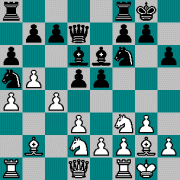
Before |

After |
And a subrecord: 12 consecutive captures on one square.
 Weiss - Burschowsky, Austria 1995
Weiss - Burschowsky, Austria 1995
37. hxg4 hxg4 38.fxg4 Nhxg4 39.Nhxg4 Nxg4 40.Nxg4 Bxg4
41.Bxg4 Qxg4 42.Qxg4 Rxg4 43.Rg1 Bh6 44.Ke1 Rdg8 45.Kf1 Rg3 46.Rb3 R8g6
47.Bd2 f3 48.Bxh6 fxg2+ 49.Kf2 Kxh6 50.Ra3 Kh5 51.Ke2 Kh4 and White
resigned.
Back to the list
Longest series of moves by one piece: 73
This record has long been in the hands of a Queen from the times of Queen Victoria, with 73 consecutive moves. As that was a very strange game between two top players, and it has been beaten by one move only, by a game from a "Girls under 16" championship (see immediately below), I will not remove it.
 Mackenzie - Mason, London 1882
Mackenzie - Mason, London 1882
From 72...Qd1 to 144...Qf4, when a draw was agreed, the black
Queen never had a moment's rest.
Back to the list
Rebickova - Voracova, Czech Republic 1995, ended with 74 checks by the
black Queen.
Back to the list
Greatest number of checks: 141 (both sides together); 100 (one side.)
In Wegner - Johnsen, Gausdal 1991, there were
100 checks by White and 41 by Black.
Back to the list
Longest mutual series of checks: 6
 Zarrouati - Brauckmann, Toulouse 1990
Zarrouati - Brauckmann, Toulouse 1990
1.d4 Nf6 2.Nf3 Rg8 3.g3 d6 4.Bg2 c6 5.c4 h6 6.Nc3 g5 7.O-O g4 8.Ne1 Qc7
9.Nd3 Nbd7 10.c5 e5 11.cxd6 Bxd6 12.d5 h5 13.dxc6 bxc6 14.Nb5 cxb5 15.Bxa8 e4
16.Nf4 Nb6 17.Bd5 h4 18.Be3 hxg3 19.hxg3 Bxf4 20.Bxf4 Qc5 21.Bb3 Qh5
22.Qd6 Nbd7 23.f3 Rh8 24.Kf2 Qh2+ 25.Ke3 gxf3 26.exf3 exf3 27.Rae1
Ng4+
28.Kxf3+ Nde5+ 29.Rxe5+ Nxe5+ 30.Qxe5+ Be6 31.Bxe6 Rh5 32.Bf5+ Kf8
and Black resigned.
Cardona - Conejero, Mislata (Spain) 2003
1.e4 g6 2.d4 Bg7 3.c4 d6 4.f4 c5 5.d5 Nf6 6.Nc3 O-O 7.Nf3 Bg4 8.Be2 Nbd7 9.O-O a6 10.h3 Bxf3 11.Bxf3 Rb8 12.a4 Ne8 13.g4 Bd4+ 14.Kh1 e6 15.Qd3 Qh4 16.Kh2 e5 17.f5 h5 18.gxh5 gxf5 19.Bh6 f4 20.Ne2 Nef6 21.Nxf4 exf4 22.Rg1+ Bxg1+ 23.Rxg1+ Qg3+ 24.Rxg3+ fxg3+ 25.Kxg3 Ne5 26.Qe3 Kh7 27.Bxf8 Rxf8 28.Qf4 Rg8+ 29.Kh2 Nfd7 30.Bg4 Nxg4+ 31.hxg4 Ne5 32.Kh3 Rg7 33.g5 Nxc4 34.h6 and Black resigned.
In a problem, a
series of 37 consecutive mutual checks has been achieved.
Back to the list
Longest sequence without captures: 151
In that 200-move game Wegner - Johnsen, the last capture was on
move 49; there followed 151 moves without a capture.
Back to the list
Many different records would fall under this heading - how long pieces stay on their original squares, or on squares they reach later. One piece, combinations of pieces, sets of pieces, all pieces... in this domain, we come dangerously close to the point where every chess game is the record holder at being itself. As a measure of immobility, I take the length of time pieces or pawns stay at their original squares - until they play, are captured, or the game is over.
Pawn: 172 (never played); Seirawan - Xu, Thessaloniki 1988
Knight: 85 (never played); Galanov - Kosanski. Budapest 1994
Bishop: 81 (never played); Levitt - Lev, Tel Aviv 1989
Rook: 105 (never played); Rebickova - Voracova, Czech Republic 1995
Queen: 76...Qa8; Alvarado - Carvajal, San Jose (Costa Rica) 2001
King: 70...Kd7; Cacho - Suba, Spain 2001
Both Kings: 47 (never played); Thorhallsson - Johannesson, Hafnarborg 2003
All pieces: 18.Qh5+; Diemer - Heiling, Nuremberg 1984
Some Honorable Mentions:
Vidarsson - Hjartarson, Iceland 1994, began with 1.e4 e5 and those pawns were still there when a draw was agreed after move 180.
Valkesalmi - Agopov, Finland 1998, began with 1.c4 c5 2.b3 d5 and that pawn stayed on d5 until it was captured with 184.Nxd5
 Also to be noted is Szabo - Ristoja, Helsinki 1975. In
the diagram, after 41.Bf3, Black resigned. All 4 Rooks are still on
their original squares, without having made one move between them.
Also to be noted is Szabo - Ristoja, Helsinki 1975. In
the diagram, after 41.Bf3, Black resigned. All 4 Rooks are still on
their original squares, without having made one move between them.
In that strange game Mackenzie - Mason, the black King was at
g8 for 136 moves.
 In Samms - Bainbridge, Engeland 1994, all black pieces were (back) at
the back rank when the game finished: 21...Nf6 22.Bxg6+ Ke7 23.Nxf7 Be6
24.Re1 Qc8 25.Nc5 and Black resigned.
In Samms - Bainbridge, Engeland 1994, all black pieces were (back) at
the back rank when the game finished: 21...Nf6 22.Bxg6+ Ke7 23.Nxf7 Be6
24.Re1 Qc8 25.Nc5 and Black resigned.
Back to the list
In Lipschütz - Bird, New York 1889, the Ng1 made 93 moves.
In Nikolic - Arsovic, Belgrade 1989, the Bf1 made 91 moves.
In that same game, the Ra8 made 155 moves.
In Seirawan - Xu, Thessaloniki 1988, the Qd8 made 116 moves.
In Bozkurt - Tanrivermis, Kusadasi 2004, the Ke8 made 123 moves.
 In Podhorzer - Palda, Vienna 1933, White had a choice of 75 moves
on his 25th move.
In Podhorzer - Palda, Vienna 1933, White had a choice of 75 moves
on his 25th move.
Back to the list
Longest symmetrical game: 16 moves.
 Rotlevi - Eljaschoff, St. Petersburg 1909
Rotlevi - Eljaschoff, St. Petersburg 1909
1.e4 e5 2.Nf3 Nf6 3.Nc3 Nc6 4.Bb5 Bb4 5.O-O O-O 6.d3 d6 7.Bxc6 Bxc3
8.Bxb7 Bxb2 9.Bxa8 Bxa1 10.Bg5 Bg4 11.Qxa1 Qxa8 12.Bxf6 Bxf3 13.Bxg7 Bxg2
14.Bxf8 Bxf1 15.Qxf1 Qxf8 16.Qg2 Qg7 (see diagram) ½-½
Back to the list
Joint record holders:

Neshewat - Garrison Detroit 1994 48...O-O |

Somogyi - Black New York 2002 48...O-O-O |
Back to the list
Greatest number of castlings: 3
Heidenfeld - Kerins, Dublin 1973
1.e4 e6 2.d4 d5 3.Be3 Nf6 4.e5 Nfd7 5.f4 c5 6.c3 Nc6 7.Nf3 Qb6 8.Qd2
c4 9.Be2 Na5 10.O-O f5 11.Ng5 Be7 12.g4 Bxg5
13.fxg5 Nf8 14.gxf5 exf5 15.Bf3 Be6 16.Qg2 O-O-O
17.Na3 Ng6 18.Qd2 f4 19.Bf2 Bh3 20.Rfb1 Bf5 21.Nc2 h6 22.gxh6 Rxh6 23.Nb4
Qe6 24.Qe2 Ne7 25.b3 Qg6+ 26.Kf1 Bxb1 27.bxc4 dxc4 28.Qb2 Bd3+ 29.Ke1 Be4
30.Qe2 Bxf3 31.Qxf3 Rxh2 32.d5 Qf5 33.O-O-O
Rh3 34.Qe2 Rxc3+ 35.Kb2 Rh3 36.d6 Nec6 37.Nxc6 Nxc6 38.e6 Qe5+ 39.Qxe5
Nxe5 40.d7+ Nxd7 0-1
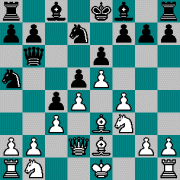
Position after 9...Na5 |

Position after 16.Qg2 |

Position after 32...Qf5 |
Back to the list
En prise is here: a piece being attacked by a pawn.
In the records I had here before, I also counted
non-captures where the pawn was pinned, or the non-capturing side was
in check. I discarded those, except for Miles - Ljubojevic, Tilburg 1986.
In that game, an attacked Knight stays put for 27 moves, the last 24 of which
its capture would have been legal.
Miles - Ljubojevic, Tilburg 1986
1.Nf3 c5 2.c4 g6 3.e4 Bg7 4.d4 Nc6 5.dxc5 Qa5+ 6.Nfd2 Qxc5 7.Be2 d6 8.O-O Nd4 9.Bd3 Nf6 10.Nb3 Nxb3 11.axb3 Ng4 12.h3 h5 13.Qd2 Qe5 14.f4 Qc5+ 15.Kh1 Bd7 16.Nc3 e6 17.Qe2 Bd4 18.Bd2 Qb6 19.Nd1 a6 20.Ba5 Qa7 21.Bb4 Qb6 22.Ba5 Qc5 23.Qe1 e5 24.Bb4 Qb6 25.Ba5 Qa7 26.f5 gxf5 27.exf5 Bc6 28.Be4 Kd7 29.f6 Rag8 30.Bxc6+ bxc6 31.Qe4 Qb7 32.Bc3 Ba7 33.b4 Kc8 34.c5 dxc5 35.Qf5+ Kb8 36.Bxe5+ Ka8 37.bxc5 Bxc5 38.Bg3 Ba7 39.Qd3 Ne3 40.Rf3 Rd8 41.Bd6 Nxd1 42.Qxd1 Rhg8 43.b4 Rg5 44.Rd3 c5 45.Bg3 Rgd5 46.Rxd5 Qxd5 47.Qa4 cxb4 48.Qxa6 Qb7 49.Qf1 Rd7 50.Bf2 Qc6 51.Bg1 Rb7 52.Qf2 Qd7 53.Qf3 Kb8 54.Qf4+ Ka8 55.Qe4 Kb8 56.Bxa7+ Rxa7 57.Qxb4+ Ka8 58.Qf8+ Kb7 59.Rxa7+ Kxa7 60.Qe7 1-0

Position after 12.h3 |

Position after 39.Qd3 |
Back to the list
In Ng - Erigayama, Manila 1992, 15 pieces were captured on d5.
Back to the list
 In Smyslov - Botvinnik, ch USSR 1941, there were 9 passed pawns.
But perhaps the pawns f3 and h6 are not really passed pawns. In
that case, many games with 8 passed pawns are the joint record holders.
In Smyslov - Botvinnik, ch USSR 1941, there were 9 passed pawns.
But perhaps the pawns f3 and h6 are not really passed pawns. In
that case, many games with 8 passed pawns are the joint record holders.
However, two games are special, with 7 passed pawns for one side,
and 1 for the other.

Puth - Mattern Heimbach 1997 Position after 32.Rxh7+ |

Stoeber - Kasnitz Germany 1999 Position after 44...Qxa4 |
Back to the list
Most adjacent pawns on 7th rank: 4
 Lee - Shoosmith, London 1904 is the only game in which one side
had 4 adjacent pawns on the 7th rank. Black's last move had been b3-b2+,
and White resigned after 58.Kxb2 d1Q 59.Kc3 Qd2+ 60.Kb2 a1Q+ 61.Kxa1 Qc3+
Lee - Shoosmith, London 1904 is the only game in which one side
had 4 adjacent pawns on the 7th rank. Black's last move had been b3-b2+,
and White resigned after 58.Kxb2 d1Q 59.Kc3 Qd2+ 60.Kb2 a1Q+ 61.Kxa1 Qc3+
Back to the list
Longest living quadrupled pawns: 23 moves
Kovacs - Barth, Balatonbereny 1994
1.e4 Nf6 2.Nc3 d5 3.exd5 Nxd5 4.Bc4 c6 5.d4 g6 6.Nge2 Be6 7.Bb3 Nxc3
8.bxc3 Bxb3 9.axb3 Bg7 10.O-O O-O 11.f4 Na6 12.Ba3 Re8 13.Qd3 Qb6
14.f5 c5 15.fxg6 fxg6 16.Qc4+ e6 17.dxc5 Qc6 18.Rad1 b5 19.Nd4 Qxg2+
20.Kxg2 bxc4 21.Nb5 Reb8 22.bxc4 (see diagram)
 Rc8 23.Nd6 Rc6 24.Ne4 Rac8 25.Rd7
R6c7 26.Rd6 Rc6 27.Rfd1 Bf8 28.Rxc6 Rxc6 29.Rd8 Kf7 30.Rd7+ Be7
31.Rxa7 h6 32.Bc1 g5 33.h4 gxh4 34.Bf4 e5 35.Bxe5 Re6 36.Nd6+ Kg6
37.Bd4 Nb8 38.Ra8 Nc6 39.Rg8+ Kh5 40.Nf5 Rg6+ 41.Rxg6 Kxg6
42.Nxe7+ Nxe7 43.Kh3 Nc6 44.Kxh4 (see diagram) draw agreed.
Rc8 23.Nd6 Rc6 24.Ne4 Rac8 25.Rd7
R6c7 26.Rd6 Rc6 27.Rfd1 Bf8 28.Rxc6 Rxc6 29.Rd8 Kf7 30.Rd7+ Be7
31.Rxa7 h6 32.Bc1 g5 33.h4 gxh4 34.Bf4 e5 35.Bxe5 Re6 36.Nd6+ Kg6
37.Bd4 Nb8 38.Ra8 Nc6 39.Rg8+ Kh5 40.Nf5 Rg6+ 41.Rxg6 Kxg6
42.Nxe7+ Nxe7 43.Kh3 Nc6 44.Kxh4 (see diagram) draw agreed.
Back to the list
Together with 'Longest game', this is the most popular, controversial
and hoaxed record. In
most databases, there is a game "Sumpter - King, Australia 1965", with 7
Queens, which was later proven to be spurious, and there is the famous game
"Alekhine - Grigoriev,
Moscow 1915" with 5 Queens, which is certainly a mystification. The
6-Queen game "Van Hall - Krabbé, Amsterdam 1963", is also reputed to be a fake.
But in 2 undisputed tournament games, there were
5 Queens simultaneously.
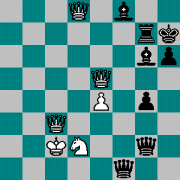 Belov - Prohorov, Chelyabinsk 1991
Belov - Prohorov, Chelyabinsk 1991
Black had just played 69...f1Q There followed
70.Qde7 Qf7 71.Qxf7 Bxf7 and already one pair of Queens has disappeared;
the five Queens were on the board for only 3 half-moves
72.Qf5+ Kg8 73.Qfc8 Qf2 74.Qb4 Bg6 75.Qbc4+ Kh7 76.Qxg4 Bd6
77.Qce6 Bb4 78.Qd5 Rc7+ 79.Kd1 Bxd2 80.Qxd2 Qf1+ 81.Qe1 Rc1+ 82.Kxc1 Qxe1+
and White resigned.
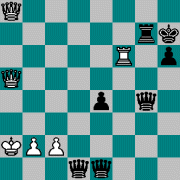 In this game, the 5 Queens remained on the board for 9 half-moves.
In this game, the 5 Queens remained on the board for 9 half-moves.
Mackic - Maksimenko, Yugoslavia 1994
Black's last move was 47...e1Q. There followed:
48.Rxh6+ Kxh6 49.Qh8+ Kg6 50.Qa6+ Kf7 51.Qb7+ Qdd7 and White resigned.
Back to the list
Longest 4-Queen sequence: 21 moves

 Milov - Timofeev, Canarias en Red, Internet 2004
Milov - Timofeev, Canarias en Red, Internet 2004
With 12...bxa1Q 13.gxh8Q a second pair of Queens had just appeared, and
only with 33...Qxa3 34.Qxa3, one pair was exchanged.
Back to the list
Earliest double polygamy: move 7
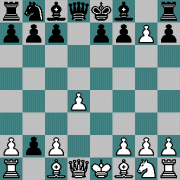 Casper - Heckert
Casper - Heckert
1.e4 Nf6 2.Nc3 d5 3.e5 d4 4.exf6 dxc3 5.d4 cxb2 6.fxg7
(see diagram) bxa1Q 7.gxh8Q Qxa2 8.Nf3 Bf5 9.Ne5 Qa5+
10.Bd2 Qad5 11.Bc4 Qe4+ 12.Be3 e6 13.O-O Qdh4 14.Bd3 Qd5 15.Bxf5 exf5
16.Re1 Nd7 17.Nf3 Qh5 18.Bg5+ Qe4 19.Qd2 f6 20.Bxf6 Qxe1+ 21.Qxe1+ Kf7
22.Ng5+ Kg6 23.Qg8+ and Black resigned.
Back to the list
 Boleslavsky - Kasparian, Parnu 1947
Boleslavsky - Kasparian, Parnu 1947
In the diagram, White had just promoted with 34.d8Q Both Queens
remained on the board to the end of the game, which came at move 89 when
Black resigned.
Back to the list
Panchenko - Vnukov, Voronezh 1999
and
Kubikova - Novy, Polsen 2003
both had 6 promotions to Queen.
Back to the list
 Serper - Navrotescu, Oakham 1988
Serper - Navrotescu, Oakham 1988
Black had just played 46...g1R That Rook promotion was not
forced (46...Ra1 was a quicker win),
but as 46...g1Q 47.Rh7+ would have been stalemate, it was justified.
Back to the list
 Szabo - Ivkov, Belgrade 1964
Szabo - Ivkov, Belgrade 1964
After 49...h1N+, there followed: 50.Kg1 Nd7 51.Rh2 Qxh2+ 52.Nxh2 Ne2+ 53.Kxh1 and White resigned on move 93.
With 7 half-moves, this is the longest 5-Knight sequence.
Back to the list
Longest 3-Knight sequence: 13 moves
 Skrobek - Kornasiewicz, Wisla 1992
Skrobek - Kornasiewicz, Wisla 1992
White had just played 70.b8N There followed:
70...Kf5 71.Nc6 Bf8 72.Ncxe5 Ne6+ 73.Kc6 Nf4 74.Nef6 Bg7 75.Nfd7 Nxh3 76.Kd6
Ng1 77.Nh2 h3 78.Neg4 Nf3 79.Kd5 Kf4 80.Nf2 Ng1 81.Nc5 Kg3 82.Nce4+ Kxh2
and 2 moves later a draw was agreed.
Back to the list
 Schweber - Wexler, Buenos Aires 1964
Schweber - Wexler, Buenos Aires 1964
46.c8N+ Rxc8 47.bxc8N+, and Black resigned.
This is the only game with two Knight promotions that were the strongest
move. On both moves, promotion to Queen would have been equally strong,
but as the Knight promotions are checks, they are more obvious.
Back to the list
(c) Tim Krabbé, 1999 - 2004
With thanks to David Paulowich; Lewis Stiller and Gady Costeff
(for Chess Query Language); Harold van der Heijden; Dennis Monokroussos;
Rob Verhoeven; René Olthof; Ken Whyld; Alain Pallier; Jack Goossens;
Eduardo Bauzá Mercere; Joop Simmelink; Øyvind Pedersen;
Gian-Carlo Proscutto; José Antônio Fabiano Mendes and many others.
Comments and suggestions | Top of the page | Main chess page | Main page |